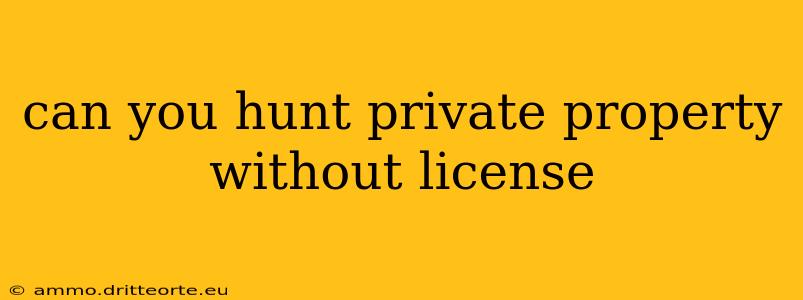Can You Hunt on Private Property Without a License? A Comprehensive Look at Trespassing and Hunting Laws
The simple answer is no, you cannot legally hunt on private property without a license, regardless of the property owner's permission. Hunting without a license is illegal in almost every jurisdiction, and hunting on private land without the owner's explicit permission constitutes trespassing, which is also a crime. Let's break this down further.
Understanding the Legal Landscape: Licenses and Permissions
Hunting regulations vary by state and even county, but common threads exist. Securing a hunting license is a fundamental requirement. This license demonstrates you've met certain requirements, including potentially completing a hunter's safety course, and have paid the necessary fees. The license grants you the legal right to hunt within the specified jurisdiction, but it doesn't automatically give you permission to hunt on any land.
Trespassing and the Importance of Permission
Even with a hunting license in hand, you must obtain the landowner's permission before hunting on their property. Entering private land without permission to hunt, even if you have a license, constitutes trespassing. The penalties for trespassing can range from fines to arrest, depending on the severity and the jurisdiction.
What constitutes permission? This needs to be clear and explicit. A simple "yes" from the landowner isn't enough; consider written permission, preferably a contract outlining the terms of your hunt, including dates, specific areas, and any restrictions. Verbal agreements can be difficult to prove if a dispute arises.
Specific Scenarios and Potential Exceptions (Rare)
While generally illegal, there might be exceptionally rare circumstances where exceptions exist. For instance:
- Hunting on your own property: If you own the land, you can hunt on it, provided you have the necessary licenses and abide by all other regulations.
- Explicit permission from the landowner: As mentioned earlier, obtaining clear and documented permission from the landowner is crucial. However, this permission is separate from needing a hunting license.
- Specific programs or permits: Some areas might have specific programs that allow hunting on private land with certain stipulations. These are typically designed to manage wildlife populations and often involve collaboration between landowners and wildlife agencies.
These exceptions are infrequent and require diligent research into your local hunting laws.
Consequences of Illegal Hunting
The penalties for hunting without a license or trespassing on private land can be severe and include:
- Fines: Substantial financial penalties can be imposed.
- Jail time: In some cases, depending on the severity of the offense, jail time is possible.
- Confiscation of equipment: Your hunting gear, including firearms and vehicles, might be seized.
- Loss of hunting privileges: Your hunting license might be revoked, prohibiting you from hunting for a specified period or permanently.
- Civil lawsuits: Landowners can sue you for damages caused by trespassing.
Conclusion: Always Obtain Permission and Obtain the Necessary Licenses
Hunting is a privilege, not a right. Respecting private property rights and adhering to hunting regulations is crucial. Always obtain the necessary licenses and explicitly seek permission from the landowner before hunting on any private property. Failure to do so can result in serious legal consequences.
Disclaimer: This information is for general knowledge and informational purposes only, and does not constitute legal advice. Always consult with local wildlife agencies and legal professionals to ensure you comply with all applicable laws and regulations in your specific area.

